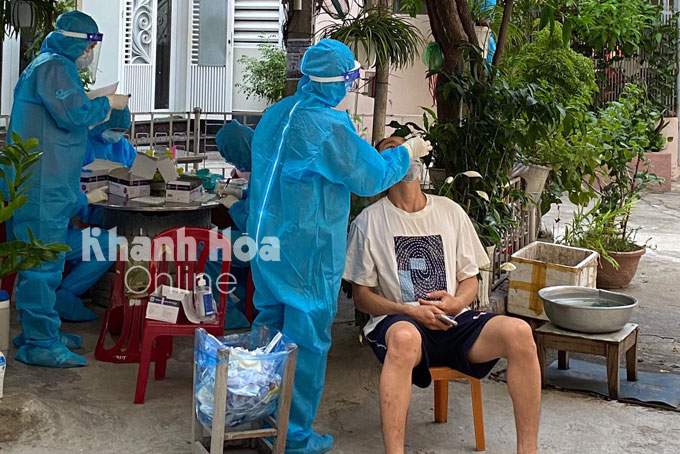
Khanh Hoa is implementing the 3rd phase of safe adaption and response to Covid-19 and socio-economic development recovery, encouraging home care and isolatiion. Khanh Hoa Provincial Steering Committee for Covid-19 Prevention and Control has just issued instructions on how to take care of people infected with Covid-19 at home...
Khanh Hoa is implementing the 3rd phase of safe adaption and response to Covid-19 and socio-economic development recovery, encouraging home care and isolation. Khanh Hoa Provincial Steering Committee for Covid-19 Prevention and Control has just issued instructions on how to take care of people infected with Covid-19 at home.
Statistics show up to 80% of infections nationwide have no symptoms and the remaining 20% have mild, moderate and severe symptoms. The Covid-19 vaccination coverage rate in the province is high. More than 98.4% people aged 18 and older have received at least one dose of Covid-19 vaccines with nearly 91% fully vaccinated. High school students are being vaccinated. The number of asymptomatic and mild cases in the province has accounted for 98%. Based on this factor, the province has developed guidelines for Covid-19 home care and treatment.
Dr. Le Van Khoa, Deputy Director of the Department of Health says out of 100 cases recorded in the province on average per day, 98 are asymptomatic and mild infections since early November. Covid-19 home care for asymptomatic and mild cases will help reduce the pressure on the provincial health sector, helping medical staff reduce workload and have time to focus on treating patients with moderate, severe and critical symptoms.
Treated at home, patients are in their familiar living environment, doing exercise, maintaining their diet and sleep routines, which are more beneficial to recovery. Besides, patients are still able to get entertained as normal or work online at home. Being close to family members, they will not feel lonely and become less stressful then at hospitals or centralized treatment facilities. Covid-19 home care and treatment will help reduce relieve doctors and hospitals from burden as well as prevent cross-infection risk.
According to the guidance, eligibility to home care includes Covid-19 asymptomatic and mild cases, fully vaccinated or having received the first vaccine dose within 14 days, aged over 1 or under 60, with no underlying health conditions and without pregnancy. Considerations for home care also include whether the patient is able to take care of himself, contact health care providers for monitoring and in case of emergency. Children and those unable to take care of themselves are required to have caregivers.
Another important point is that the patient should stay in a separate house or flat with good ventilation and sufficient soap and hand sanitizer containing 60% of alcohol; body check devices inside rooms, medical waste bins, and sufficient protection gears available for other people to use when in contact with the patient to keep everyone safe. A sign saying Covid-19 home care is required to be hung in front of the house or flat.
The local health care sector has made detailed guidance for Covid-19 home care; establishment of mobile medical stations and support groups to take care of Covid-19 patients in the community; procedures for Covid-19 treatment at home; given training to localities to run mobile medical stations on management, monitoring and care of Covid-19 patients at home with instructions for F0 on how to take medicines, use medical equipment (Spo2 meters, thermometers); deal with emergency situations, including transfer to medical facilities in case of worsening symptoms.; how to use the homecare app with telephones for patients to call when necessary; instructions on how to monitor patients’ treatment, collect and treat medical waste, etc.
Covid-19 home care is voluntary and recommended to eligible patients due to the benefits mentioned above.
T.L
Translated by N.T











